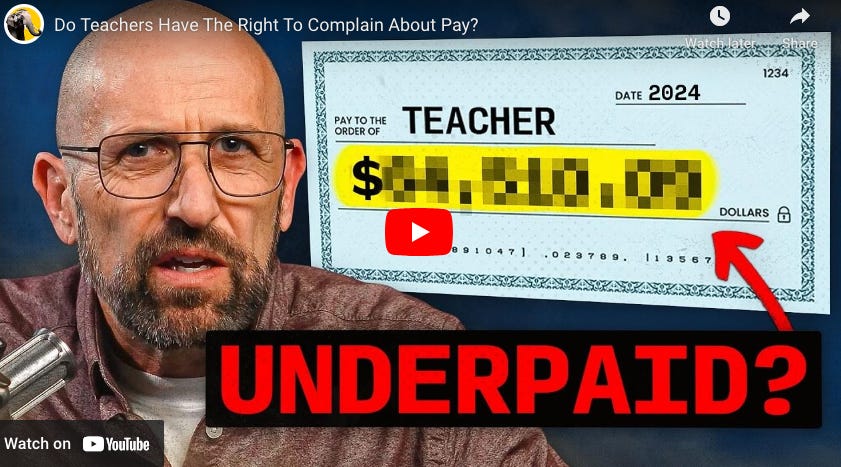For my whole life, I’ve been told that teachers are woefully underpaid. But are they really?
Unlike most people, teachers’ salaries aren’t determined by free markets. Instead, their salaries are set by politicians. Teachers’ unions – often some of the biggest political donors in the country – have a vested interest in convincing everyone that teachers are poor. And they’re really good at that.
One trick they use is to always bring the conversation to “starting salaries.” And teachers’ starting salaries – like the starting salaries of many professions – are often pretty low. Starting teacher salaries are almost $45,000, while the average U.S. teacher earns just under $70,000. (These numbers change hugely based on region.)
And while you can torture the numbers in all sorts of ways, it’s hard to really see the “unfairness.” How do other professions compare?
Electricians – $65,000
Real Estate Agents – $66,000
Police Officers - $71,000
Teachers – $70,000
Registered Nurses – $89,000
Accountants – $87,000
Often left out of the conversation are the amazing perks that teachers get. Like no one else.
Their biggest perk is time off, starting with most of summer, about two and a half months. Teachers also get time off for spring break, winter break, fall break, holidays, snow days, and personal days. There are 260 weekdays in a year, and schools are open about 180 of them. That allows for quite a better lifestyle than you can find in most private jobs.
Another perk is benefits. Like most public employees, their retirement pensions and healthcare outshine almost all private sector jobs.
Finally, they have unparalleled job security. In the private world, companies downsize, change owners, or go out of business altogether. In the public school system, that’s super rare. Overall government jobs are secure, and it’s especially true for teachers.
And part of that job security comes from teacher tenure. It was created to protect academic freedom and let teachers explore ideas without fear. The vast majority of public school teachers get tenure after a two- or three-year probationary period. After that? It’s almost impossible to fire them. There aren’t many professions where after a few years on the job, you can only be fired for gross misconduct.
Teaching is both an important and hard job, trying to make often-difficult young people less stupid. For me? I doubt I’d last a week without being fired or arrested. But that doesn’t mean they’re being paid unfairly.
I get into a lot more interesting statistics and comparisons in my latest video essay. If you watch it, leave a comment there!
– Ken






Some could say the greatest challenge for teachers is the hostile work environment dealing with the outrageous behavior of a percentage of the students and lack of disciplinary support from the Administration.
This analysis, without factoring in geographical influence, is flawed from the start. Don't compare Oklahoma with any big city. Also, while they are earning their retirement, the payout doesn't start until they actually retire, and it varies based on years worked. And don't forget hours at home spent creating lesson plans and grading papers. I suggest a follow-up study of a few select cities, which should include cost of living, to give this a fair appraisal.